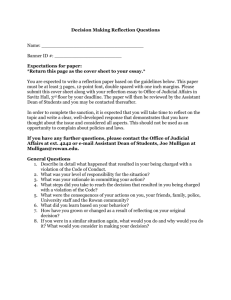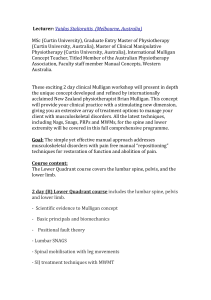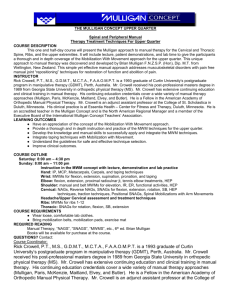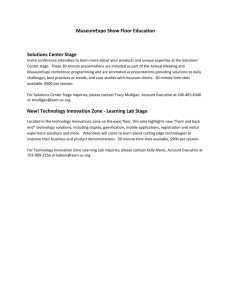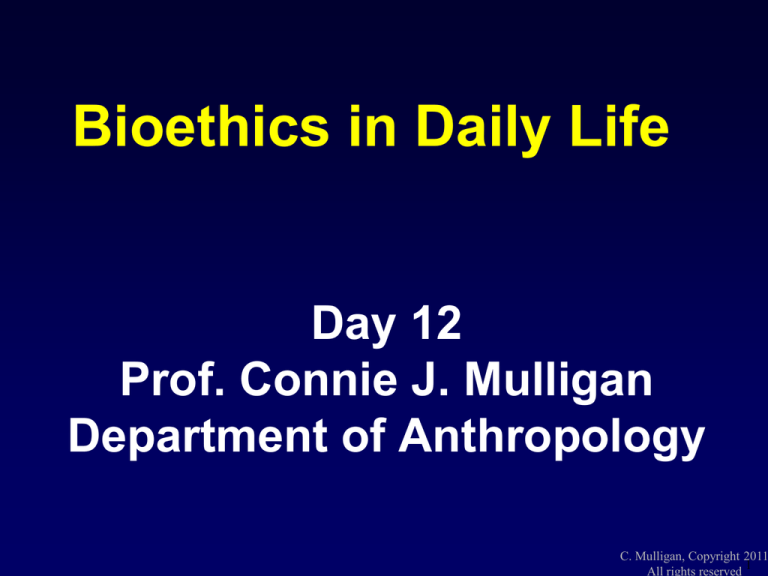
Bioethics in Daily Life
Day 12
Prof. Connie J. Mulligan
Department of Anthropology
C. Mulligan, Copyright 2011
1
All rights reserved
This week
•
Animal cognition/animal rights
–
–
–
–
•
Animal exploitation
Vegetarianism and other uses of animals
Animal experimentation
Animal cognition/what separates us from other animals?
Reading
–
Bioethics at the Movies
• Chpt 4 (The Babe vegetarians: Bioethics, animal minds, and moral
methodology)
–
•
•
“ Wanted: Intelligent aliens, for a research project”, Olivia
Judson, New York Times, Sept 30, 2008
Video – Babe
Oral presentations (quest for a good life/death)
–
–
For/Against memory deletion as a means of happiness
For/Against other technological/pharmaceutical interventions as
a means of happiness
C. Mulligan, Copyright 2011
All rights reserved
2
Next week
•
Sample collection for research
–
–
–
–
–
•
Informed consent issues
Collection of samples from impoverished people/people from developing countries
Return of samples
Return of skeletal remains/archaeological artifacts
Right/responsibility to participate in research
Reading
–
–
–
–
–
–
–
•
•
DNA returned to tribe, raising questions about consent, Science, April 30, 2010
Researchers to return blood samples to the Yanomamo, Science, June 4, 2010
Iceland: The case of a national human genome project, Anthro Today, Oct, 1999
Grave disputes, Science, Oct 8, 2010, 330:166
Science education: Research on the reservation, Nature, March 2, 2011, 471:25-26
Of HeLa and human lives, Science, Feb 26, 2010, 327:1081
Taking the least of you, The New York Times, April 16, 2006
Video – Gene Hunters
Oral presentations (animal cognition/animal rights)
–
–
For/Against vegetarianism
Huge/small difference between us and other animals
C. Mulligan, Copyright 2011
3
All rights reserved
Final paper
• Paper – 100 pts
– In-depth analysis of a bioethical issue of your choice
– There must be a clear biological aspect to the issue and
you must explain the science and how it relates to your
chosen bioethical issue, in addition to developing the
bioethical issue
• Class is Bioethics in Daily Life
• Could be more broadly technological, but be sure to say you
know this is not biological content
• I gave ideas for biological content in some of last week’s group
projects so you know what I’m talking about. Feel free to email
me if you’re unsure about the biologically scientific content of
your paper.
– You must include at least 3 scientific peer-reviewed
articles
– The expected length ~3000 words, or ~5-7 single-spaced
pages.
C. Mulligan, Copyright 2011
4
All rights reserved
Class poll
• How many are vegetarians?
C. Mulligan, Copyright 2011
5
All rights reserved
Class poll
• How many are vegetarians?
• How many eat beef and pork?
C. Mulligan, Copyright 2011
6
All rights reserved
Class poll
• How many are vegetarians?
• How many eat beef and pork?
• How many eat veal?
C. Mulligan, Copyright 2011
7
All rights reserved
Class poll
•
•
•
•
How many are vegetarians?
How many eat beef and pork?
How many eat veal?
How many eat dolphin?
C. Mulligan, Copyright 2011
8
All rights reserved
Class poll
•
•
•
•
•
How many are vegetarians?
How many eat beef and pork?
How many eat veal?
How many eat dolphin?
How many eat chimpanzee?
C. Mulligan, Copyright 2011
9
All rights reserved
Animal rights
• Yesterday’s Science - Lawyer and legal scholar
Steven Wise is suing to give chimps and dolphins
certain basic rights on basis that they meet
requirements for legal personhood, not property
– Concerned about small cages/aquaria, but bigger
implications
• In 1998, Wise lost a case for a dolphin named Kama to sue the
New England Aquarium to prevent being transferred to a Navy
marine mammal facility
• In 2004, San Francisco judge ruled that whales, porpoises, and
dolphins did not have legal standing to sue the Navy to stop
allegedly harmful sonar testing
• In both cases, judges ruled that only “persons” can sue under
federal law
– Similarities to giving slaves and robots rights as ‘people’
http://www.sciencemag.org/content/332/6025/30.full
C. Mulligan, Copyright 2011
10
All rights reserved
What has animal testing
done for medical advances?
C. Mulligan, Copyright 2011
11
All rights reserved
What has animal testing
done for medical advances?
• Late 1880s - diphtheria vaccine was tested in animals and
essentially eliminated disease
• 1920s – isolation of insulin from dogs and cattle to save
human diabetics
• 1940s-1960s – polio vaccine (Salk and Sabin ‘live’) tested in
monkeys
– ~ eradicated disease by 1965 & ~100,000 Rhesus macaques killed
• Therapeutic use of penicillin – tested in mice
• Organ transplantation
– Heart transplantation – tested in dogs
• Most drugs, vaccines, painkillers, anesthetics, surgery, etc
can’t be tested in tissue culture & don’t want to go straight
to humans without some animal testing
C. Mulligan, Copyright 2011
en.wikipedia.org/wiki/History_of_animal_testing, wildcat.arizona.edu/2.2255/animal-testing-necessary-in-medical-research-1.169288
12
All rights reserved
What has animal testing
done for medical advances?
• Horror stories of lack of animal testing
– In 1983, Vitek exploited a loophole in FDA regulations to
bring a synthetic jaw implant to market without
adequate testing (10,000s people received it)
– Vitek's implant fragmented in patients' jaws, triggering
a chemical reaction that literally eroded away their
jawbones
– 1984 study in dogs found that the implants
disintegrated in the canine test subjects and lead to jaw
erosion akin to that seen in human patients
C. Mulligan, Copyright 2011
13
All rights reserved
Video
C. Mulligan, Copyright 2011
14
All rights reserved
Discussion
• Animals are anthropomorphized in Babe, e.g. they can talk
– Is this ‘unfair’ or does it serve a purpose?
C. Mulligan, Copyright 2011
15
All rights reserved
Animal cognition
• PARROT INTELLIGENCE: DR.
PEPPERBERG with AFRICAN GREYS
GRIFFIN, ALEX & EINSTEIN
• http://www.youtube.com/watch?v=O_
Fpad20Zbk&feature=player_embedde
d
C. Mulligan, Copyright 2011
16
All rights reserved
Chimp cognition and
behavior
• Cooperation and its limitations
– http://www.youtube.com/watch?v=3mv8
rfJmCPk&feature=related
C. Mulligan, Copyright 2011
17
All rights reserved
Discussion
• What kind of intelligence or cognition or
language or emotions do animals have?
C. Mulligan, Copyright 2011
18
All rights reserved
Discussion
• What difference does an animal’s
intelligence, language, emotions, etc make?
• If you’re not a vegetarian, what would make
you change?
C. Mulligan, Copyright 2011
19
All rights reserved
Bottom line
• What do you think are good rules for
eating animals?
• For using animals in research?
C. Mulligan, Copyright 2011
20
All rights reserved
Next week’s oral presentations
•
Oral presentations (animal cognition/animal
rights)
–
–
For/Against vegetarianism
Huge/small difference between us and other animals
C. Mulligan, Copyright 2011
21
All rights reserved

